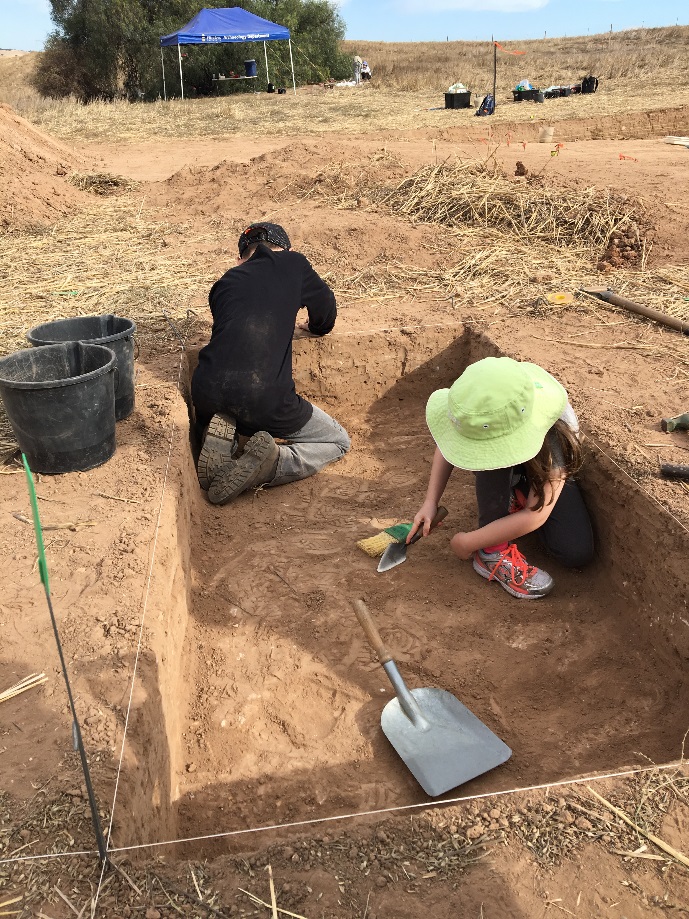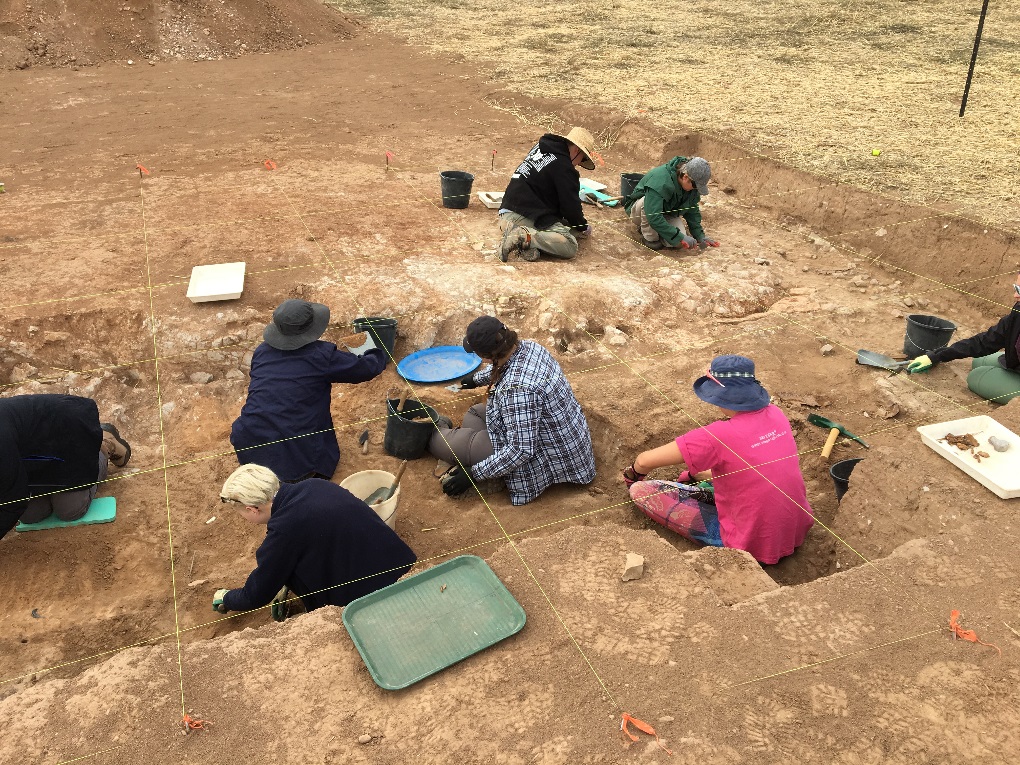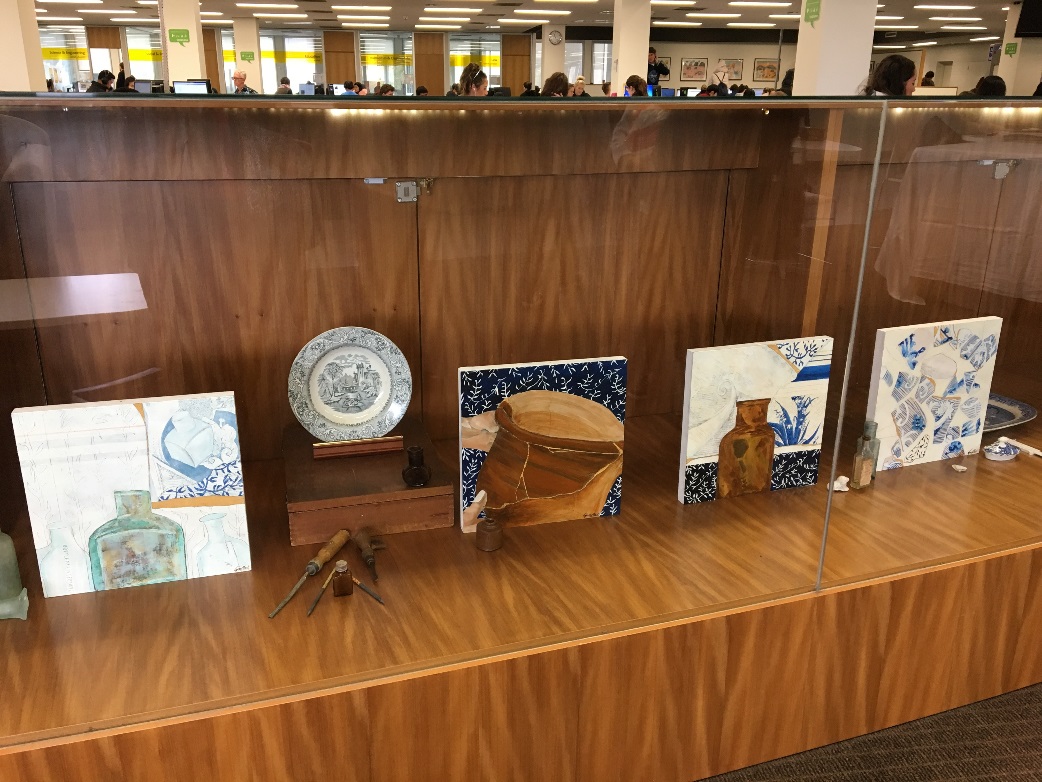Research Engagement and ImpactExcavating with and in a Community
Doctoral Candidate, Archaeology Department
Flinders University
www.dontforgetyourshovel.com

Even the young can excavate a straight trench wall!
I’ve just returned from leading an archaeological excavation at Baker’s Flat near Kapunda, South Australia, as part of the research for my PhD in archaeology.
Today, it’s a wheat paddock on private land, but in the nineteenth century Baker’s Flat was a vibrant Irish community. Although its residents made up a large proportion of the broader Kapunda community, they weren’t very popular locally. In the recorded histories, where Baker’s Flat gets mentioned at all, the predominant message is of fights and hovels, animals running wild, drunkenness, lawlessness, and dirt. The Baker’s Flat community was first written off, and then written out of the histories.
Which is where community comes in. The story of Baker’s Flat was remembered by just a few local historians, who shared it with me. And in the 'heel of the hunt', as we say in Ireland, those historians and I embarked on an historical and archaeological journey of exploration about this site. A journey that has now encompassed old and young, academics and community members, archaeologists and artists.

Volunteer crew hard at work in the trench.
When I first looked at the site, I was told that there had been dugouts, but I couldn’t see it. I was thinking of dugouts like those at Burra, very defined and easy to see the remains of in the creek bed. However, a geophysical survey of part of the site showed anomalies consistent with the size of houses, and when we excavated one of these, it turned out to be a dugout. Not the same as at Burra, but one that was dug lightly into the side of the hill to form shelter walls, which were then used as the foundation for other walls made of flattened tin and hessian. And all consistent with oral histories collected in the 1970s and folklore passed down by the Kapunda historians.
Talking to the landowner, he remembered his father telling him how he was able to buy the land cheap after the last war because it was so full of junk and big holes that it was impossible to work. He covered the land with 10cms of top soil, but where there were large holes from the dugouts, he pushed in the "junk" (wheelbarrows, bedsteads, bathtubs) and added up to a metre of top soil to level the land. These memories helped explain the stratigraphy of the site, and helped me to determine where to work.
And the important thing here is time. The landowner and I have spent a lot of time standing and thinking, looking at holes in the ground. If you don’t allow the time to build trust with people, then you really miss out.
It shows the importance of communication and collaboration, and the fact that effective public engagement demands time and the ability to wait, generosity of spirit, trust, and the ability to ask good questions and listen well to the answers.
Historical archaeologists are in the fortunate position of working in a truly multidisciplinary field. I would argue that because we can combine texts and archaeology, oral histories and public involvement, we are really able to help archaeology to live in the public arena, and allow different stories and voices to be heard. One of the most enjoyable research outputs so far has been a series of 12 oil paintings by artist Lynn Mack, which is based on ceramic and glass artefacts excavated at Baker’s Flat. The exhibition, Unearthed, is currently on display in the Flinders University Central Library.

Unearthed: an exhibition of paintings by Lynn Mack based on artefacts excavated at Baker’s Flat.
More posts in "Research Engagement and Impact" series:
- (13 Dec 2018) ECR Spotlight - Dr Ben Lewis
- (29 Nov 2018) Impact Seed Funding – supporting our Flinders ECRs – Dr David Smith
- (29 Nov 2018) Research Roundup - 29 November 2018
- (15 Nov 2018) Impact Seed Funding – supporting our Flinders ECRs – Dr Lua Perimal-Lewis
- (14 Nov 2018) Research Roundup - 15 November 2018
- (01 Nov 2018) Flinders research from an undergraduate class to a record breaking swim attempt
- (01 Nov 2018) Research Roundup - 1 November 2018
- (31 Oct 2018) ECR Spotlight - Dr Bev Rogers
- (31 Oct 2018) Flinders researchers trip to Germany on bringing science to market
- (18 Oct 2018) Melbourne and Canberra fellowships advance research and leadership skills for Flinders researcher
- (18 Oct 2018) Impact Seed Funding – supporting our Flinders ECRs - Dr Linlin Ma
- (18 Oct 2018) Research Roundup - 18 October 2018
- (04 Oct 2018) How can Australian innovation create new industries and jobs?
- (04 Oct 2018) Research Roundup - 4 October 2018
- (27 Sep 2018) Saving Nemo at Ngeringa Winery
- (20 Sep 2018) Assisting the UN and developing nations on how to measure wellbeing
- (20 Sep 2018) Equity Hub to assist translating research into change
- (06 Sep 2018) Steps to improve gender diversity in coastal geoscience and engineering
- (23 Aug 2018) Finding the invisible traces
- (09 Aug 2018) Diving in Deep to strengthen links with UNESCO members
- (09 Aug 2018) Impact Seed Funding – supporting our Flinders ECRs
- (09 Aug 2018) Older Adults engaging for a better quality of life
- (08 Aug 2018) The scientist’s guide to a successful career in academia
- (27 Jul 2018) Flinders aiming to lead the blueeconomy
- (27 Jul 2018) Can you have a conversation with a computer?
- (12 Jul 2018) Flinders linking with arts and culture to explore their real value
- (12 Jul 2018) WHO internship for Flinders researcher
- (28 Jun 2018) Flinders linkage grants success
- (28 Jun 2018) Flinders’ led project top in Radiation Research
- (18 Jun 2018) Nothing going to waste - Flinders NIH Success
- (18 Jun 2018) ECR Spotlight - In Conversation with Dr Sam Elliott
- (29 May 2018) Flinders leading the reviews to improve remote health
- (17 May 2018) Generating conversation through The Conversation
- (15 May 2018) ECR Spotlight - Dr Ashok Manoharan 2018
- (03 May 2018) Flinders’ Archaeologist off to Cambridge for a year
- (26 Mar 2018) New chapter of Indigenous history told through food
- (08 Mar 2018) Flinders linking with Indigenous groups to explore aspects of colonial Australia
- (22 Feb 2018) ECR Spotlight - Ian Moffat
- (21 Feb 2018) Flinders working to Beat Cancer
- (25 Jan 2018) Why are little penguins declining?
- (25 Jan 2018) Scimex - Register now to be a part of breaking news
- (24 Jan 2018) ECR Spotlight - Alice Clement
- (21 Dec 2017) A Flinders first - automated launch and recovery for autonomous underwater vessels
- (13 Dec 2017) 2017 Vice-Chancellor's Award for Early Career Researchers
- (11 Dec 2017) ECR Spotlight - Vishnu KK Nair
- (06 Dec 2017) NHMRC success for Flinders
- (24 Nov 2017) Aiming to improve the health, education and wellbeing of children
- (17 Nov 2017) Accelerating the Interplay Wellbeing Framework
- (16 Nov 2017) 2018 Visiting International Research Fellows to Flinders
- (15 Nov 2017) ECR Spotlight - Ashokkumar Manoharan
- (15 Nov 2017) 2018 Flinders Endeavour Scholars and Fellows announced
- (14 Nov 2017) Time to Bragg about science writing
- (10 Nov 2017) Flinders Forensic Science cleans up at Awards
- (10 Nov 2017) Flinders successes in the recent ARC grant round
- (30 Oct 2017) Students Present Around the World
- (20 Oct 2017) Over $8 Million to Flinders from the National Palliative Care round
- (19 Oct 2017) ECR Spotlight - Sam Schultz
- (17 Oct 2017) Flinders' Fresh Scientists in the Pub
- (11 Oct 2017) Indigenous knowledge, not just for Indigenous communities
- (06 Oct 2017) Leading Drug and Alcohol researchers at Flinders’ NCETA secure $1.7 million in funding
- (05 Oct 2017) ECR Spotlight - Margaret Shanafield
- (28 Sep 2017) Our Distinguished Geographer
- (07 Sep 2017) ECR Spotlight - George Karpetis
- (01 Sep 2017) Eureka! Prize for blood test for bowel cancer recurrence
- (22 Aug 2017) Different environments, different DNA, different dolphins?
- (17 Aug 2017) ECR Spotlight - Dr Harriet Whiley
- (03 Aug 2017) ECR Spotlight - Giselle Rampersad
- (17 Jul 2017) Time to Scope your research - FAST
- (17 Jul 2017) Time to Scope your research - Hoverflies
- (13 Jul 2017) Tips from a first time interviewee
- (12 Jul 2017) Saving Nemo at the Star of Greece
- (07 Jul 2017) Invasion of the European crabs
- (20 Jun 2017) Fossil finds bring Australia's evolutionary history to life
- (07 Jun 2017) Peer Prize up for grabs
- (02 Jun 2017) Tracking the marine ecosystems in South Australia
- (29 May 2017) Be Your Best for Impact
- (18 May 2017) Aiming to catch criminals as never before
- (05 May 2017) Excavating with and in a Community
- (29 Apr 2017) What does engagement look like? Community-initiated research.
- (24 Apr 2017) Planning for one of the world’s youngest nations
- (07 Apr 2017) Pitching ON tasty seaweed jelly
- (29 Mar 2017) Best and Brightest for Hearts
- (27 Mar 2017) The Best Student Publications - Flinders 2016 edition
- (16 Mar 2017) From workshop to book - Underwater archaeology and 3D
- (21 Dec 2016) Recent Funding Success
- (21 Dec 2016) Research Impact - Point of Care Testing
- (21 Dec 2016) New ARC College of Experts
- (20 Dec 2016) Flinders Celebrates - 2016 Research Successes
- (19 Dec 2016) Vice-Chancellor Awards for Research Excellence
- (19 Dec 2016) Cardiology, Mental Health Projects among NHMRC Grant Success


Comments
I enjoyed reading and reflecting on your article which demonstrated positivity and lots of heart in impact and engagement. The aspect of trust mentioned in the article is so relevant in this day and age and necessary for engaging in community. Well done! Keep up the development of relationships with community. Genuineness and the ability to listen are so important.
Just working on approval of such a project. A cornerstone is the local community if nothing else the buy in for the project. These people know more than we do.
I read your write-up on your work with excitement. Interestingly, I am currently working on such an abandoned settlement in part of Yoruba land of Nigeria. I am currently waiting for the result of the geophysical survey.
Thanks for the comments! Very interesting to hear about the work of others in various parts of the world. In the end, archaeology is always about the people isn't it, those in the past and those in the present.
Comment preview